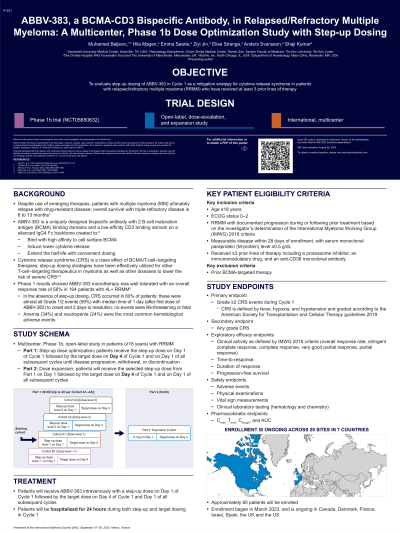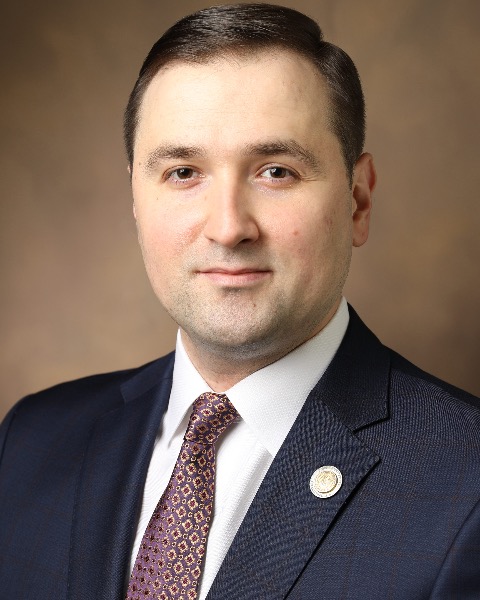Treatment of Relapsed/Refractory Myeloma
Poster Session 2
P-231: ABBV-383, a BCMA-CD3 Bispecific Antibody, in Relapsed/Refractory Multiple Myeloma: A Multicenter, Phase 1b Dose Optimization Study With Step-up Dosing
Thursday, September 28, 2023
12:30 PM - 1:30 PM EEST


Muhamed Baljevic, MD, FACP
Associate Professor of Medicine, Division of Hematology-Oncology
Vanderbilt-Ingram Cancer Center, Vanderbilt University Medical Center, Tennessee, United States
Introduction: Multiple myeloma (MM) is characterized by malignant plasma cell accumulation in the bone marrow. Despite use of emerging therapies, patients ultimately relapse with drug-resistant disease; overall survival with triple-refractory disease is 6–13 months.
ABBV-383 is a fully human bispecific antibody that targets both B-cell maturation antigen (BCMA), a highly expressed protein on the surface of MM cells, and CD3 on the surface of T-cells. This dual-binding results in T-cell activation and selective destruction of BCMA-positive MM cells.
Phase 1 results in patients with triple-class exposed relapsed/refractory MM (RRMM) showed ABBV-383 was well-tolerated with an overall response rate of 63%. Cytokine release syndrome (CRS) occurred in 57% of patients; these were mostly single Grade 1/2 events with median time of 1 day (after first dose of ABBV-383) to both onset and to resolution; no events were life-threatening or fatal. Neutropenia (37%) and anemia (29%) were the most common hematological AEs.
Step-up dosing strategies, where a lower initial dose is given prior to the full dose, have been effectively utilized for other T-cell targeting therapeutics in myeloma as well as other diseases to lower the risk of severe CRS. The intent with this Phase 1b trial, which is currently enrolling, is to evaluate step-up dosing of ABBV-383 in Cycle 1 as a mitigation strategy for CRS.
Methods: The primary objective is to assess frequency and severity of CRS in patients with RRMM treated with ABBV-383 monotherapy with step-up dosing. Primary and secondary endpoints are Grade ≥2 CRS during Cycle 1 and any CRS during the study, respectively. Secondary objectives are to assess safety and tolerability of ABBV-383 in these patients.
Exploratory efficacy endpoints are clinical activity as defined by IMWG 2016 criteria, including objective response rates, time to response, duration of response, and progression-free survival.
Eligible patients are aged ≥18 years with ECOG status 0–2 and RRMM with documented progression after last treatment. Patients must be BCMA-targeted therapy-naïve and have received ≥3 lines of therapy, including a proteasome inhibitor, an immunomodulatory drug, and an anti-CD38 monoclonal antibody.
The study consists of 2 phases: step-up dose optimization and dose expansion. In the dose optimization phase, patients receive the step-up dose on Day 1 of treatment Cycle 1 and the target dose on Day 4 of Cycle 1. In Cycle 2 and all subsequent cycles, patients receive the target dose on Day 1. Therapy continues until disease progression, withdrawal, or discontinuation. Patients are hospitalized for 24 hours during both step-up and target dosing in Cycle 1.
In the dose expansion phase, patients will receive the optimum step-up dose on Day 1 and the target dose on Day 4 of Cycle 1. Patients receive the target dose on Day 1 of subsequent cycles.
This trial is currently enrolling at 34 sites in 7 countries: US, Canada, Denmark, France, Israel, Spain, and the UK.
Results: n/a
Conclusions: n/a
ABBV-383 is a fully human bispecific antibody that targets both B-cell maturation antigen (BCMA), a highly expressed protein on the surface of MM cells, and CD3 on the surface of T-cells. This dual-binding results in T-cell activation and selective destruction of BCMA-positive MM cells.
Phase 1 results in patients with triple-class exposed relapsed/refractory MM (RRMM) showed ABBV-383 was well-tolerated with an overall response rate of 63%. Cytokine release syndrome (CRS) occurred in 57% of patients; these were mostly single Grade 1/2 events with median time of 1 day (after first dose of ABBV-383) to both onset and to resolution; no events were life-threatening or fatal. Neutropenia (37%) and anemia (29%) were the most common hematological AEs.
Step-up dosing strategies, where a lower initial dose is given prior to the full dose, have been effectively utilized for other T-cell targeting therapeutics in myeloma as well as other diseases to lower the risk of severe CRS. The intent with this Phase 1b trial, which is currently enrolling, is to evaluate step-up dosing of ABBV-383 in Cycle 1 as a mitigation strategy for CRS.
Methods: The primary objective is to assess frequency and severity of CRS in patients with RRMM treated with ABBV-383 monotherapy with step-up dosing. Primary and secondary endpoints are Grade ≥2 CRS during Cycle 1 and any CRS during the study, respectively. Secondary objectives are to assess safety and tolerability of ABBV-383 in these patients.
Exploratory efficacy endpoints are clinical activity as defined by IMWG 2016 criteria, including objective response rates, time to response, duration of response, and progression-free survival.
Eligible patients are aged ≥18 years with ECOG status 0–2 and RRMM with documented progression after last treatment. Patients must be BCMA-targeted therapy-naïve and have received ≥3 lines of therapy, including a proteasome inhibitor, an immunomodulatory drug, and an anti-CD38 monoclonal antibody.
The study consists of 2 phases: step-up dose optimization and dose expansion. In the dose optimization phase, patients receive the step-up dose on Day 1 of treatment Cycle 1 and the target dose on Day 4 of Cycle 1. In Cycle 2 and all subsequent cycles, patients receive the target dose on Day 1. Therapy continues until disease progression, withdrawal, or discontinuation. Patients are hospitalized for 24 hours during both step-up and target dosing in Cycle 1.
In the dose expansion phase, patients will receive the optimum step-up dose on Day 1 and the target dose on Day 4 of Cycle 1. Patients receive the target dose on Day 1 of subsequent cycles.
This trial is currently enrolling at 34 sites in 7 countries: US, Canada, Denmark, France, Israel, Spain, and the UK.
Results: n/a
Conclusions: n/a
